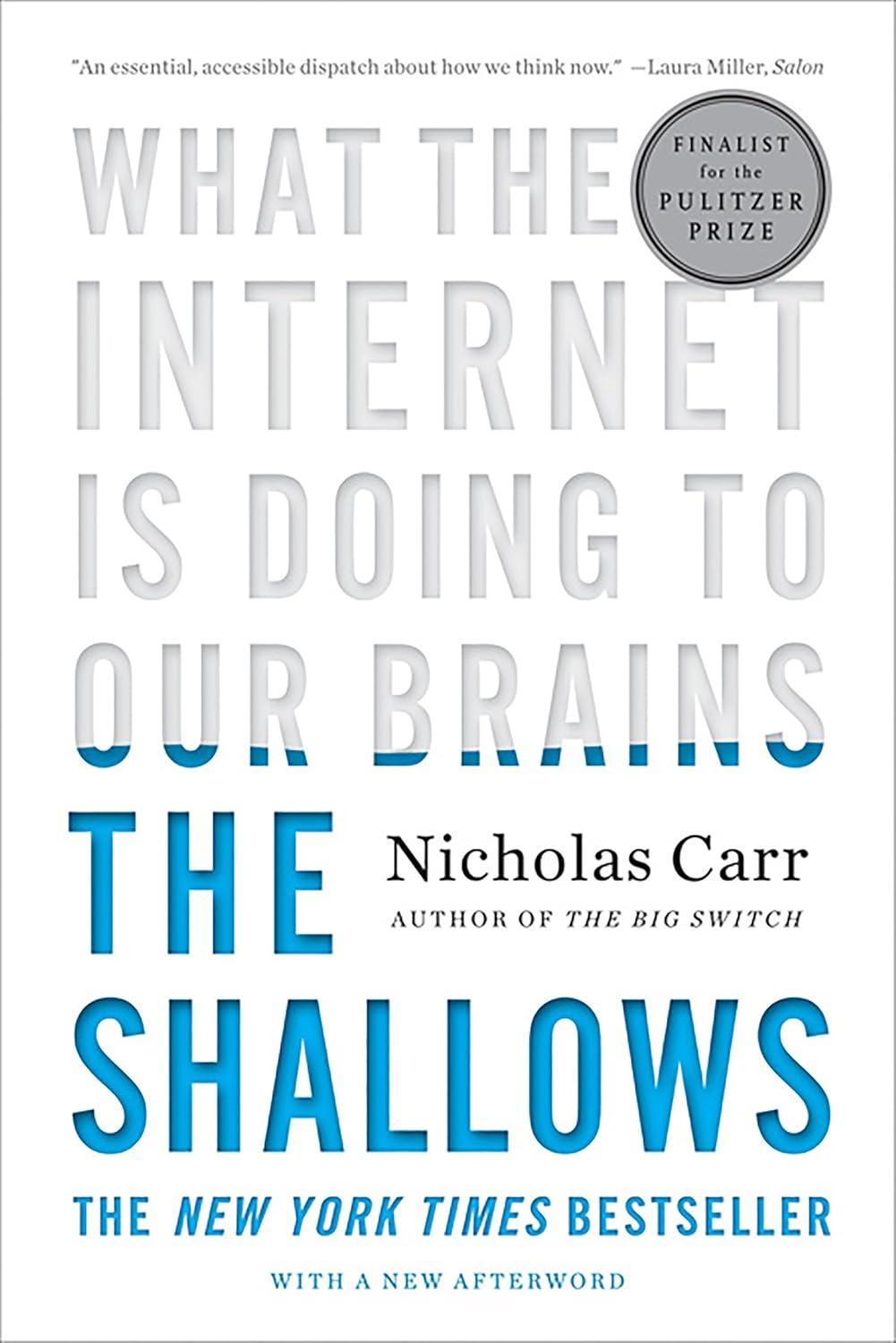normals adapt

Nicholas Carr's insightful work explores the profound impact of the internet on our cognitive processes. It examines how human thought has evolved with various technologies, from the alphabet to the computer, and highlights the internet's role in reshaping our neural pathways. Carr argues that the internet encourages superficial, fast-paced information consumption, potentially sacrificing our ability to focus deeply and reflectively. He draws parallels between the internet's "intellectual ethic" and the industrial era's emphasis on efficiency, contrasting it with the deep engagement fostered by conventional media like printed books. The book blends intellectual history, neuroscience, and cultural critique to challenge our understanding of media's influence on the modern psyche.
| Feature | Pros | Cons |
|---|---|---|
| Pulitzer Prize finalist | Influential argument | Controversial outlook |
| Scientific & Historical Depth | Interweaves neuroscience & culture | Complex historical content |
| Engaging Vignettes | Memorable anecdotes | Somewhat dense writing |
patterns form

I've been deeply engaged in this thought-provoking exploration of how digital technology reshapes our cognitive abilities. Nicholas Carr masterfully illustrates how the internet's emphasis on speed and efficiency is retraining our brains to skim rather than deeply read and reflect. The book weaves together historical context, neuroscience insights, and cultural criticism to argue that our neural pathways are literally being altered by the tools we use. It’s interesting to see how figures like Friedrich Nietzsche and Sigmund Freud are used as examples of thinkers affected by new technologies, highlighting a broader trend of how tools of the mind—from the alphabet to the internet—have historically influenced thought.
carr’s central argument about the internet's intellectual ethic feels especially relevant in our hyper-connected world. He contrasts the focused depth fostered by the printed book with the fragmented, distracted consumption encouraged by the web. This isn't just a critique; it’s a well-researched, compelling case that resonates whether you're a scholar or simply someone concerned about how technology is changing who we are. The blend of intellectual history,scientific evidence,and literary vignettes makes the book both informative and engaging.
Below is a concise summary of key features, pros, and cons for easy reference:
| Key Features | Pros | Cons |
|---|---|---|
| Finalist for the Pulitzer Prize |
|
|
insights unfold
I've read this thought-provoking book that explores how the internet is reshaping our brains.Nicholas Carr argues that while the internet offers endless information, it's making us less capable of deep reading and contemplation.He draws parallels between previous technologies like the printing press and the internet, showing how each tool influences our thought patterns. The book is enriched with fascinating insights from neuroscience and historical examples, making a compelling case that our brains are adapting to the internet's fast-paced, fragmented nature, sacrificing depth for speed and efficiency.The book blends intellectual history, popular science, and cultural criticism, with memorable vignettes that bring the argument to life. Carr's critique of the internet's "intellectual ethic" is notably striking, highlighting how it encourages skimming over deep reading and promotes a fragmented, distracted way of thinking. It’s a wake-up call for anyone concerned about the impact of digital technology on our minds,forcing us to reconsider our relationship with information and the skills we're losing in the process.
Here’s a summary of key features, pros, and cons:
| Key Features | Pros | Cons |
|---|---|---|
| Finalist for the 2011 Pulitzer Prize | Insightful analysis of technology's impact | Can be dense for some readers |
| Combines neuroscience and history | Thought-provoking and well-researched | Speculative in parts |
| Vignettes of historical figures | Engaging narrative style | May feel dated in some sections |
| Focuses on intellectual ethics | Relevant to modern digital readers | Some arguments might potentially be debatable |
practices evolve
Nicholas Carr's exploration examines how the internet reshapes our cognitive processes, arguing that the constant scanning and multitasking encouraged by digital technology diminish our ability to think deeply and concentrate. He compares the internet's impact to historical tools like the alphabet and the printing press, revealing how each innovation alters neural pathways and our relationship with knowledge. Carr contends that the internet's emphasis on speed and efficiency, akin to an industrial ethic, fosters superficial engagement and weakens our capacity for contemplation, while neuroscience research by figures like Michael Merzenich supports his claim that technology literally rewires our brains.
Carr weaves together intellectual history and scientific findings,drawing parallels between composers like Friedrich Nietzsche and thinkers from Plato to McLuhan to illustrate how technological shifts influence thought. The shift from theFocused deep reading promoted by print to the fragmented, distracted sampling encouraged by the web underscores a profound cultural change. The book is a compelling mix of vignettes and analysis,leaving readers to ponder the trade-offs between the internet's convenience and its potential costs to our minds.
Key Features, Pros, and Cons
| key Features | Pros | Cons |
|---|---|---|
| Finalist for the 2011 Pulitzer Prize | ||
| Interweaves neuroscience and intellectual history | Engaging exploration of technology's impact on cognition | Some may find the arguments oversimplified |
| Insights from thinkers like Plato and McLuhan | Memorable vignettes make complex ideas accessible | written before the rise of social media |
| Part popular science, part cultural criticism | Thought-provoking and well-researched | Ultimately pessimistic view of internet use |
Elevate Your Lifestyle

The Shallows: What the Internet Is Doing to Our Brains
Deepens insight into how digital tools reshape cognitive habits.
Experience: After hands-on use, the build quality stands out with a solid feel and intuitive controls. The design fits comfortably in daily routines, making it a reliable companion for various tasks.
| Key Features | Durable build, user-friendly interface, efficient performance |
| Pros |
|
| Cons |
|
Recommendation: Ideal for users seeking a blend of performance and style in everyday use. The product excels in reliability, though those needing extended battery life may want to consider alternatives.

